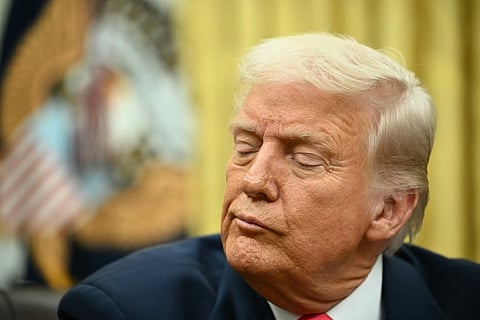
- NEWS
- the EDIT
- COMMENTARY
- BUSINESS
- LIFE
- SHOW
- ACTION
- GLOBAL GOALS
- SNAPS
- DYARYO TIRADA
- MORE

On Wednesday, President Donald Trump's administration ordered the closure of a US agency that invested billions in infrastructure across Africa and other developing countries in exchange for good governance, effectively ceding ground to China.
The Millennium Challenge Corporation (MCC) will immediately exit projects worldwide, from building roads to modernizing electricity grids, likely leaving works under construction unless other partners step in.
At a staff meeting on Wednesday, an MCC executive told employees that "we are coming to an orderly close" and that all programs would be discontinued, according to a present staffer.
The meeting followed a staff-wide memo, seen by AFP, which announced that billionaire Elon Musk’s Department of Government Efficiency was imposing a "significant reduction" at MCC and outlined the logistics for the majority of staff who will lose their jobs.
Founded in 2004 under President George W. Bush with bipartisan support, MCC signed contracts to invest US funds in developing countries that meet standards on economic transparency and good governance.
To date, MCC has invested $17 billion in numerous high-profile projects.
Just last October, Zambian President Hakainde Hichilema — who has been praised for consolidating democracy — pledged to uphold "shared values" with the US as he signed a $500 million agreement to improve roads, irrigation, and electricity infrastructure.
Trump has made clear his limited interest in sub-Saharan Africa and his opposition to development aid, which he views as not directly benefiting the US. He previously shuttered the US Agency for International Development (USAID), a much larger aid body.
An MCC employee, speaking on condition of anonymity to avoid retaliation, emphasized how MCC's mission differed from USAID’s.
"We're not doing humanitarian assistance. We're not doing social justice. We're building an environment for private-sector investment in foreign economies," she told AFP.
"This is a very different thing — something that actually does put America first."
She added, "It's interesting — if we're worried about China's influence in the world, that we would shutter MCC, which builds large-scale infrastructure that counters China's influence."
Area of competition with China
Infrastructure projects — roads, hospitals, and other facilities — have been a hallmark of China’s global outreach. The US regards China as its chief strategic adversary.
Chinese President Xi Jinping pledged another $51 billion in investment for Africa over the next three years during a summit in September.
Under former President Joe Biden, the US acknowledged it could not match China’s massive state-led spending, but aimed to offer a more sustainable model of development.
MCC will inform countries on Friday that compacts will be terminated within 40 days, the staffer said.
Following negotiations with Musk's team, MCC was allowed limited extensions in four countries: Ivory Coast, Mongolia, Nepal, and Senegal.
In Nepal, Mongolia, and Senegal, MCC will have up to three months, mainly to secure construction sites.
The aim, the employee said, is "so someone is not going to fall into a pit or something. Whether or not we'll be successful, I don't know."
MCC was granted slightly more time in Ivory Coast, where work on major road integration projects is close to completion.
In Nepal, the $500 million grant, finalized in 2022 despite protests from leftist groups in Kathmandu, aims to upgrade roads and expand cross-border electricity trading with U.S.-aligned India.
In Senegal, a $600 million initiative — $550 million from MCC and $50 million from the Senegalese government — focused on expanding electricity access in rural areas.
Elizabeth Hoffman, executive director for North America at ONE, the anti-poverty group co-founded by Bono, expressed concern over the shutdown.
"MCC brings an innovative and entrepreneurial approach to development assistance that holds governments accountable and effectively counters malign foreign influences like China," she said.
Neither MCC nor the Trump administration immediately commented on the cuts, which were first reported by the development news platform Devex.
